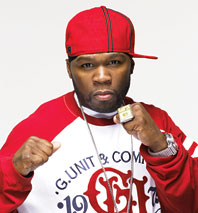
It’s been a turbulent summer for 50 Cent. His take from the sale of Glacéau—which sells VitaminWater—to Coca-Cola has been estimated as high as $100 million. He postponed his third album, Curtis, until September after formulaic early singles bombed. And now he’s bounced back with the rugged “I Get Money” and the Timbalake collaboration “She Wants It.” 50 talked to Ben Williams about the difference between himself and Eminem, the art of beef, and Dubya.
Which M.C.’s first inspired you?
I really enjoyed “The Bridge Is Over” by KRS-One. That song had a huge impact when it came out. The aggression. “Manhattan keeps on making it / Brooklyn keeps on taking it / Bronx keeps creating it / Queens keeps on faking it.” I’m from Queens! But the record was so hot that we had to listen to it anyway.
Were there Queens rappers around you at the time?
The Lost Boyz. Freaky Tah lived one block from my house. They just had a different vibe. They would drink deuce-deuces—that’s a 22-ounce beer—and just hang out. It was about having fun. And my focus was different. I had a financial focus at that point. So I was in the street, hustling.
You rapped about some of the legendary Queens drug dealers on “Ghetto Quaran.” Did those guys influence you?
They turned a lot of people into drug addicts. [And] they inspired people who didn’t use drugs to attempt that lifestyle, because they seen them acquire finances at a pace that would be almost impossible in any other field.
The first producer you worked with was Jam Master Jay from Run-D.M.C. What did he teach you?
He taught me how to songwrite, as opposed to just rapping. He’d be like, “Yo, where’s the hook?” To this day, when I start a song off, I write the chorus before I write my verses. A lot of artists are backwards. They write all of these punch lines, and they just figure out whatever they can for the hook.
And what have you learned from Eminem and Dr. Dre?
When I’m in the studio with Dre, I’ll be recording to a skeleton. “In Da Club” didn’t have the guitar on it, half the beat wasn’t on it when I wrote it. Em is different. I respect his opinion more than everybody else’s. I can accept criticism from him because he actually sells more records than me. But he has no interest in selling you a T-shirt. He’s satisfied with his financial status. My ambition is leading me through a tunnel that won’t end.
Beefs—with Ja Rule, with the Game, and lately with Cam’ron—have been central to your career. Do you think sometimes it’s smarter not to respond?
Nah. I seen Jay-Z use those tactics countless times. He’ll just ignore the guy that’s being disrespectful. But I think a lot of them are like kids—if you don’t spank their hand and say stop, it gets worse. I think, better to give them an example of you ruining someone’s career, like I did with Ja Rule.
What were you listening to while working on the new album?
I stopped listening to hip-hop records because I believe all artists steal from each other without being conscious of it. I’ve been listening to the Motown era, Marvin Gaye. I think it’s interesting that he would write about not actually being able to pay his taxes [on “Inner City Blues”]. Even if a hip-hop artist can’t pay their taxes, they’re not gonna say it.
You have a street fiction series now. Did you have a favorite author when you were growing up?
Donald Goines. He used terminologies that actually existed in the streets where I was from, so that made it easier to keep up with the story.
Let’s talk about The 48 Laws of Power. How did that book influence you?
That book is great. Me and Robert Greene are actually writing a book together now called The 50th Law. I explained to Robert that in different environments, people would interpret what he’s saying differently. Where I’m from, they interpret the laws literally. So one of the laws is, “When you destroy, destroy completely.” For someone from where I grew up, that means “don’t shoot ’em, kill ’em.”
You bought Mike Tyson’s house. Is that because he inspired you in some way?
Mike Tyson at one point convinced everyone in the world that no one can beat him. I think that’s a major accomplishment.
What about George Bush? You famously called him a gangster.
George Bush has a talent: He has less compassion than the average human. By all means, I don’t aspire to be like George Bush.
Curtis
September 4.